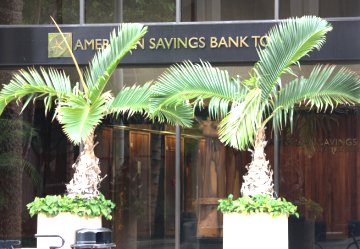 For some reason I started thinking today about the old saying, “It’s just like money in the bank.” Perhaps that was a hint that I ought to get back to the series I started a while back on financial adages and what we might learn from them. After all, there is a kernel of truth in just about everything we hear, but when an old saying gets passed on from one generation to the next, it’s much more than just an old saying…it’s more like wisdom dressed up in the robes of a legend.
For some reason I started thinking today about the old saying, “It’s just like money in the bank.” Perhaps that was a hint that I ought to get back to the series I started a while back on financial adages and what we might learn from them. After all, there is a kernel of truth in just about everything we hear, but when an old saying gets passed on from one generation to the next, it’s much more than just an old saying…it’s more like wisdom dressed up in the robes of a legend.
With all of the talk about ballooning federal debt, hyper-inflation, downward pressure on wages, and more confiscatory taxes, what we all could use is a great big pile of money, preferably placed inside a bank vault with our name on it. If there is any truth to the saying, then perhaps we ought to start thinking about embracing things other than money…things that are tantamount to a sizable stash of cash in the bank.
First let’s look at the characteristics of money in the bank. What is it? Allow me to suggest a handful of ideas.
- A resource for emergencies or those “rainy days”
- Something that appreciates in value
- Safeguarded wealth and a source of income
- A resource that’s out of sight and inconvenient; therefore it’s not conducive to spending
- An item desired by others; something we can trade for other things we’d rather have
I started thinking about what one might consider to be just like money in the bank, and I created a short list of what seems that way to me. It didn’t take much time at all to create the list, so perhaps there are many things that share the characteristics noted above. As I present each example, let me highlight in italics how at least one of the characteristics I mentioned might apply.
The traditional vegetable garden. Providing food for yourself and family means you spend less money paying for what’s served on your table. Simple seeds, soil, water and sunlight appreciates in value by providing edible stems, buds, bulbs, roots, leaves and fruits. My backyard chickens are a similar food producing asset, providing something desired by others. More simply put, money you don’t spend on table fare is money that stays as safeguarded wealth in the bank.
Silver coins known as “junk silver” come and go at the coin shop in my town. The owner explains the phenomenon by simply saying, “People need money for rent, groceries and gasoline.” With a value of roughly 22 times face value, those 90% silver coins that we’ve been finding and saving have appreciated in value and for some of us make for a good resource for rainy days.
Bulk purchases that store well. If you buy vehicle fuel in bulk in the winter, by the time summer comes along, not only will it appreciate in value, perhaps by 30% or more, but you now have something that is not conducive to spending, but rather a resource for daily use over the long haul.
A long list of loyal and prompt paying customers for the small business owner. These customers are provided good service and a fair price, and that’s one way the business owner safeguards a source of income.
Vacation and sick time as an employee benefit. If you don’t use it, it’s known as “banked” paid time off. How much more evidence do we need that paid time off, received as a benefit from an employer, is just like money in the bank? It’s an emergency resource as well as something that often can be applied towards early retirement, something that is clearly desired by others.
Firewood for heating your residence. Greece just raised the price of heating oil by about 50% simply by increasing the taxes on it by 450%. You can imagine that firewood is desired by others and a good resource for those cold and rainy days. The cost of firewood to heat your home isn’t a minor expense, so those of us who have a good source of firewood have a form of money in the bank.
Education and experience. It’s well known that lateral and upward mobility is most often enjoyed by those who have gone to school and become skilled up through hands-on experience. When it’s put to good use, it’s called talent, and talent is always in demand. In other words, it’s desired by others and it’s something that can be traded for other things we’d rather have…like money in the bank.
Not all of the above examples will represent money in the bank to all of us because of our varied interests, abilities and sense of value, but generally it’s clear that there are many things one might consider as being equivalent to money. If we have these things, and they’re in demand, then we’re in a better position to barter, and when we barter with members of our community, that means we don’t need to take away from our pile of money in the bank. The end result is we tend to keep more of our money, and Ben Franklin would be proud because he counseled us so many years ago, “A penny saved is a penny earned.”
So, what is it in your life that provides you with the sense of having money in the bank?